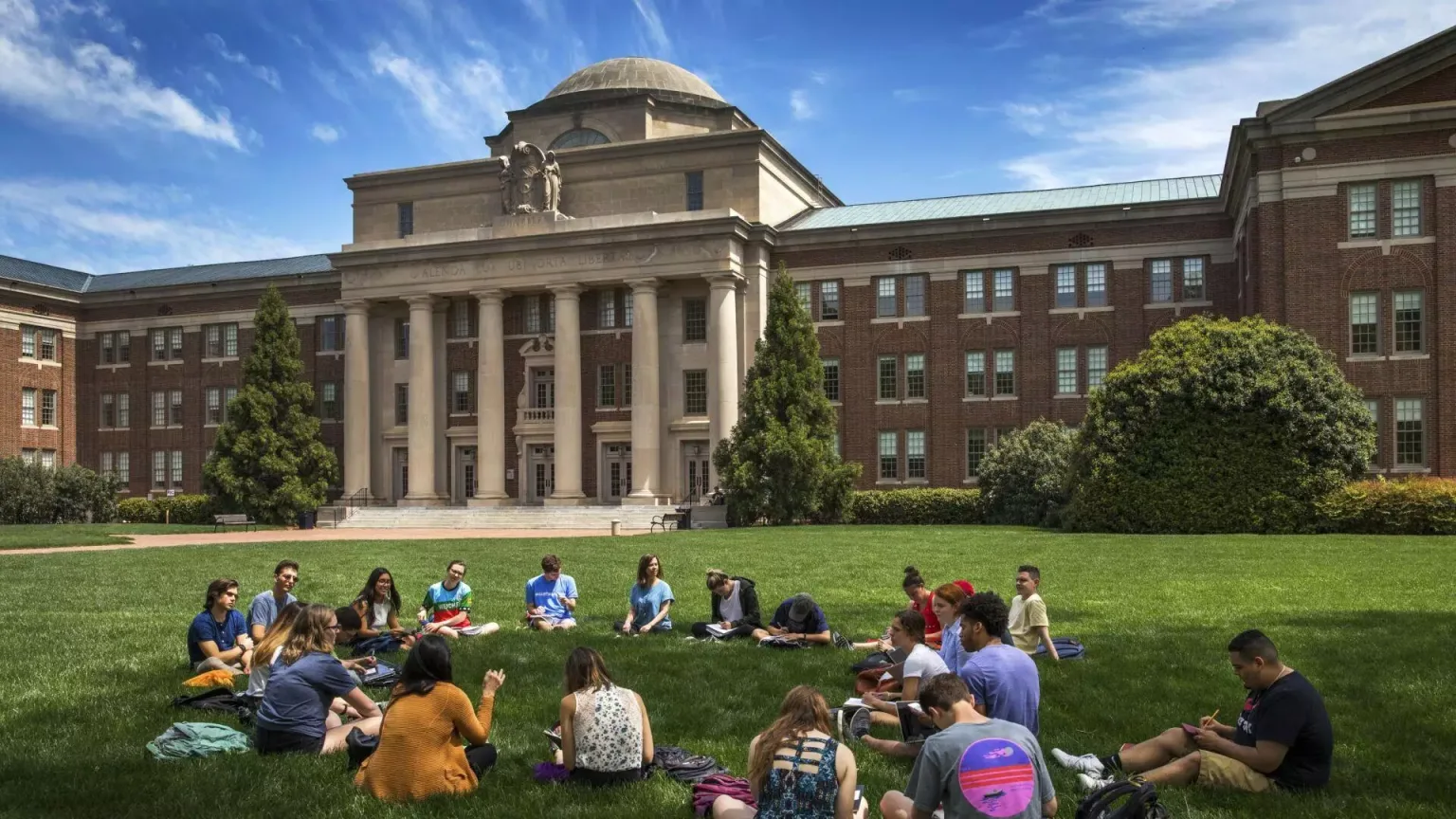The United States remains one of the most sought-after destinations for higher education, attracting students from around the globe.
With its world-renowned universities, diverse academic programs, and many scholarship opportunities, the U.S. offers an unparalleled educational experience. As we look ahead to 2025, the landscape of scholarship opportunities in the USA is more promising than ever.
This article aims to comprehensively analyse the 2025 scholarship opportunities, covering details about universities, scholarship programs, requirements, deadlines, degrees, and the application process.
Additionally, we will discuss the benefits of studying in the U.S., visa and immigration information for international students, and tips on how to make the most of these opportunities.
USA Universities Offering Scholarships in 2025
The United States is home to some of the world’s top universities, many offering generous scholarships to domestic and international students.
These institutions are known for their academic excellence, cutting-edge research, and vibrant campus life. Below is a list of some of the top U.S. universities offering scholarships in 2025:
1 Harvard University
Harvard University, located in Cambridge, Massachusetts, is one of the most prestigious universities in the world. Known for its rigorous academic programs and distinguished faculty, Harvard offers a range of scholarships to international students.
The Harvard Scholarship is one of the most generous, covering full tuition, room, board, and even travel expenses for students with demonstrated financial need.
2 Stanford University
Stanford University, located in the heart of Silicon Valley, is renowned for its innovation and entrepreneurship.
Stanford offers several scholarship programs, including the Knight-Hennessy Scholars Program, which provides full funding for graduate students, including tuition, stipend, and travel expenses.
3 Massachusetts Institute of Technology (MIT)
MIT is a global leader in science, technology, engineering, and mathematics (STEM) education. The MIT Scholarship is need-based and covers the full cost of attendance, including tuition, housing, and meals. International students can apply, and the scholarship is awarded based on financial need.
4 University of California, Berkeley
UC Berkeley is one of the top public universities in the U.S., known for its research excellence and diverse student body.
The Berkeley Undergraduate Scholarship is available to domestic and international students and provides financial support based on academic merit and financial need.
5 Columbia University
Columbia University, located in New York City, offers a range of scholarships for international students. The Columbia Scholarship is need-based and covers full tuition, room, and board for undergraduate students. Graduate students can also apply for various fellowships and assistantships.
6 Yale University
Yale University, located in New Haven, Connecticut, is known for its strong liberal arts programs and commitment to financial aid.
The Yale Scholarship is need-based and covers the full cost of attendance, including tuition, room, and board. International students are eligible to apply.
7 University of Chicago
The University of Chicago is known for its rigorous academic programs and strong emphasis on research. The University of Chicago Scholarship is need-based and covers full tuition, room, and board for undergraduate students. Graduate students can also apply for various fellowships and assistantships.
8 Princeton University
Princeton University, located in Princeton, New Jersey, is known for its strong commitment to financial aid. The Princeton Scholarship is need-based and covers full tuition, room, and board for undergraduate students. International students are eligible to apply.
9 University of Pennsylvania
The University of Pennsylvania, located in Philadelphia, offers a range of scholarships for international students. The Penn Grant is need-based and covers full tuition, room, and board for undergraduate students. Graduate students can also apply for various fellowships and assistantships.
10 Duke University
Duke University, located in Durham, North Carolina, is known for its strong medical, law, and business programs. The Duke Scholarship is need-based and covers full tuition, room, and board for undergraduate students. International students are eligible to apply.
USA Scholarship Opportunities Details and Programs
Scholarships in the U.S. can be broadly categorized into merit-based, need-based, and program-specific scholarships. Below is a detailed analysis of the different types of scholarships available in 2025:
Merit-Based Scholarships
Merit-based scholarships are awarded to students based on their academic achievements, extracurricular activities, and leadership qualities. These scholarships do not consider financial need and are often highly competitive. Some of the top merit-based scholarships in 2025 include:
- Fulbright Scholarship: The Fulbright Program is one of the most prestigious scholarship programs in the world. It offers funding for graduate study, research, and teaching in the U.S. The scholarship covers tuition, airfare, a living stipend, and health insurance.
- Rhodes Scholarship: The Rhodes Scholarship is awarded to outstanding students from around the world to study at the University of Oxford. However, U.S. citizens can also apply for the Rhodes Scholarship to study in the U.S. The scholarship covers full tuition, a living stipend, and airfare.
- Gates Cambridge Scholarship: The Gates Cambridge Scholarship is awarded to outstanding students from outside the UK to study at the University of Cambridge. However, U.S. citizens can also apply for a scholarship to study in the U.S. The scholarship covers full tuition, a living stipend, and airfare.
Need-Based Scholarships
Need-based scholarships are awarded to students based on their financial need. These scholarships are designed to help students who cannot afford college. Some of the top need-based scholarships in 2025 include:
- Harvard Scholarship: The Harvard Scholarship is need-based and covers full tuition, room, board, and even travel expenses for students with demonstrated financial need.
- Yale Scholarship: The Yale Scholarship is need-based and covers the full cost of attendance, including tuition, room, and board. International students are eligible to apply.
- Stanford Scholarship: The Stanford Scholarship is need-based and covers full tuition, room, and board for undergraduate students. International students are eligible to apply.
Program-Specific Scholarships
Program-specific scholarships are awarded to students based on their chosen field of study. These scholarships are often funded by organizations, corporations, or government agencies interested in promoting education in a particular field. Some of the top program-specific scholarships in 2025 include:
- National Science Foundation (NSF) Graduate Research Fellowship: The NSF Graduate Research Fellowship is awarded to students pursuing research-based Master’s or doctoral degrees in STEM fields. The fellowship provides a three-year annual stipend, tuition support, and opportunities for international research.
- Hubert H. Humphrey Fellowship Program: The Humphrey Fellowship Program is a non-degree program for experienced professionals from designated countries. The fellowship provides a year of professional enrichment in the U.S., including tuition, living expenses, and travel costs.
- Chevening Scholarship: The Chevening Scholarship is awarded to outstanding students from around the world to study in the UK. However, U.S. citizens can also apply for a scholarship to study in the U.S. The scholarship covers full tuition, a living stipend, and airfare.
USA Scholarship Opportunities Requirements and Deadlines
Each scholarship program has its own set of requirements and deadlines. Below is a general overview of the standard requirements and deadlines for scholarships in 2025:
General Requirements
- Academic Transcripts: Most scholarships require applicants to submit their academic transcripts as proof of their academic achievements.
- Letters of Recommendation: Applicants must often submit letters of recommendation from teachers, professors, or employers who can attest to their academic and personal qualities.
- Personal Statement or Essay: Many scholarships require applicants to submit a personal statement or essay explaining their academic and career goals and why they deserve the scholarship.
- Proof of Financial Need: For need-based scholarships, applicants may be required to submit financial documents, such as tax returns or bank statements, to demonstrate their financial need.
- Standardized Test Scores: Some scholarships may require applicants to submit standardized test scores, such as the SAT, ACT, GRE, or GMAT.
USA Scholarship Opportunities Degrees and Programs Offered
U.S. universities offer various degree programs, from undergraduate to doctoral levels. Below is an overview of the degrees and programs offered by U.S. universities in 2025:
Undergraduate Degrees
Undergraduate or bachelor’s degrees typically take four years to complete. Some of the most popular undergraduate programs in the U.S. include:
- Bachelor of Arts (BA): A BA degree is typically awarded in the humanities, social sciences, and liberal arts.
- Bachelor of Science (BS): A BS degree is typically awarded in the natural sciences, engineering, and technology.
- Bachelor of Fine Arts (BFA): A BFA degree is awarded in the fine arts, including visual arts, theatre, and dance.
Graduate Degrees
Graduate degrees, or Master’s degrees, typically take one to two years to complete. Some of the most popular graduate programs in the U.S. include:
- Master of Arts (MA): An MA degree is typically awarded in the humanities, social sciences, and liberal arts.
- Master of Science (MS): An MS degree is typically awarded in the natural sciences, engineering, and technology.
- Master of Business Administration (MBA): An MBA degree in business administration is awarded and is one of the most popular graduate programs in the U.S.
Doctoral Degrees
Doctoral degrees, or PhDs, typically take three to five years to complete. Some of the most popular doctoral programs in the U.S. include:
- Doctor of Philosophy (PhD): A PhD degree is awarded in various fields, including the humanities, social sciences, natural sciences, and engineering.
- Doctor of Education (EdD): An EdD degree is awarded in education and is designed for educators who want to advance their careers in academia or educational leadership.
- Doctor of Medicine (MD): An MD degree is awarded in medicine and required to practice as a physician in the U.S.
How to Apply for USA Scholarship Opportunities in 2025
Applying for scholarships in the U.S. can be a complex process, but with careful planning and preparation, you can increase your chances of success. Below is a step-by-step guide on how to apply for scholarships in 2025:
Research Scholarship Opportunities
The first step in applying for scholarships is to research the available opportunities. Visit the websites of the universities you are interested in and look for scholarship programs that match your academic and financial needs.
Check Eligibility Requirements
Once you have identified the scholarships you want to apply for, carefully review the eligibility requirements. Make sure you meet all the criteria before proceeding with your application.
Prepare Your Application Materials
Most scholarship applications require a combination of the following materials:
- Academic Transcripts: Request official transcripts from your school or university and ensure they are sent directly to the scholarship provider.
- Letters of Recommendation: Ask your teachers, professors, or employers to write letters of recommendation on your behalf. Provide them with ample time to complete the letters and make sure they are submitted before the deadline.
- Personal Statement or Essay: Write a compelling personal statement highlighting your academic achievements, career goals, and why you deserve the scholarship. Make sure to proofread your essay and have someone else review it before submitting it.
- Proof of Financial Need: If you are applying for a need-based scholarship, gather all the necessary financial documents, such as tax returns or bank statements, to demonstrate your financial need.
- Standardized Test Scores: If required, register for and take the necessary standardized tests, such as the SAT, ACT, GRE, or GMAT. Make sure to send your scores directly to the scholarship provider.
Submit Your Application
Once you have gathered all the necessary materials, submit your application before the deadline. Double-check all the information and documents to ensure they are complete and accurate.
After submitting your application, follow up with the scholarship provider to confirm they received all your materials. If you are selected for an interview, prepare thoroughly and make a good impression.
Visas and Immigration for International Students
International students who wish to study in the U.S. must obtain a student visa. Below is an overview of the visa and immigration process for international students:
Types of Student Visas
There are three main types of student visas for international students:
- F-1 Visa: The F-1 visa is the most common type of student visa issued to students who wish to pursue academic studies or language training programs in the U.S.
- J-1 Visa: The J-1 visa is issued to students participating in exchange programs, such as the Fulbright Program or the Hubert H. Humphrey Fellowship Program.
- M-1 Visa: The M-1 visa is issued to students who wish to pursue vocational or non-academic studies in the U.S.
Visa Application Process
The visa application process typically involves the following steps:
- Receive an I-20 Form: Once accepted into a U.S. university, you will receive an I-20 form from the university’s international student office. This form is required to apply for an F-1 or M-1 visa.
- Pay the SEVIS Fee: Before applying for a visa, you must pay the SEVIS fee and obtain a receipt. The fee funds the Student and Exchange Visitor Information System (SEVIS).
- Complete the DS-160 Form: The DS-160 is the online application for a U.S. visa. You must complete it and print the confirmation page.
- Schedule a Visa Interview: After completing the DS-160 form, you must schedule a visa interview at the U.S. embassy or consulate in your home country. Be prepared to bring all the necessary documents, including your I-20 form, SEVIS fee receipt, DS-160 confirmation page, and proof of financial support.
- Attend the Visa Interview: During the visa interview, the consular officer will ask you questions about your academic plans, financial situation, and ties to your home country. Be honest and confident in your responses.
Maintaining Visa Status
Once you arrive in the U.S., you must maintain your visa status by following the rules and regulations set by the U.S. government. This includes:
- Enrolling in a Full Course of Study: F-1 and M-1 students must take full courses each semester. Failure to do so can result in the loss of your visa status.
- Keeping Your I-20 Form Updated: If you change your major, transfer to another university, or extend your program, you must update your I-20 form and notify the international student office.
- Working on Campus: F-1 students can work on campus for up to 20 hours per week during the academic year and full-time during breaks. However, you must obtain permission from the international student office before starting any job.
- Travelling Outside the U.S.: If you plan to travel outside the U.S. during your studies, obtain a travel signature on your I-20 form from the international student office. This signature is required to re-enter the U.S.
Whether you are an undergraduate, graduate, or doctoral student, the U.S. offers many resources and support to help you succeed. Take the time to explore your options, reach out to university admissions offices, and seek guidance from mentors and advisors. With determination and hard work, you can make your dream of studying in the U.S. a reality.





 Anonix
Anonix